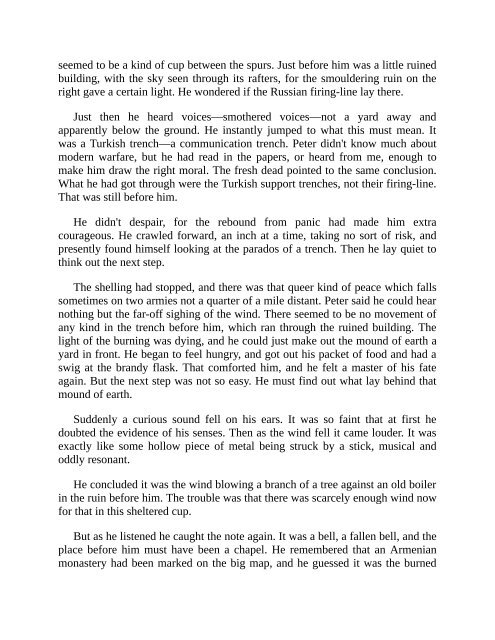Greenmantle - John Buchan
Greenmantle es la segunda de las cinco novelas de John Buchan con el personaje de Richard Hannay , publicado por primera vez en 1916 por Hodder & Stoughton , Londres . Es una de las dos novelas de Hannay ambientadas durante la Primera Guerra Mundial , la otra es el Sr. Standfast (1919); La primera y más conocida aventura de Hannay, The Thirty-Nine Steps (1915), se desarrolla en el período inmediatamente anterior a la guerra.
Greenmantle es la segunda de las cinco novelas de John Buchan con el personaje de Richard Hannay , publicado por primera vez en 1916 por Hodder & Stoughton , Londres . Es una de las dos novelas de Hannay ambientadas durante la Primera Guerra Mundial , la otra es el Sr. Standfast (1919); La primera y más conocida aventura de Hannay, The Thirty-Nine Steps (1915), se desarrolla en el período inmediatamente anterior a la guerra.
You also want an ePaper? Increase the reach of your titles
YUMPU automatically turns print PDFs into web optimized ePapers that Google loves.
seemed to be a kind of cup between the spurs. Just before him was a little ruined<br />
building, with the sky seen through its rafters, for the smouldering ruin on the<br />
right gave a certain light. He wondered if the Russian firing-line lay there.<br />
Just then he heard voices—smothered voices—not a yard away and<br />
apparently below the ground. He instantly jumped to what this must mean. It<br />
was a Turkish trench—a communication trench. Peter didn't know much about<br />
modern warfare, but he had read in the papers, or heard from me, enough to<br />
make him draw the right moral. The fresh dead pointed to the same conclusion.<br />
What he had got through were the Turkish support trenches, not their firing-line.<br />
That was still before him.<br />
He didn't despair, for the rebound from panic had made him extra<br />
courageous. He crawled forward, an inch at a time, taking no sort of risk, and<br />
presently found himself looking at the parados of a trench. Then he lay quiet to<br />
think out the next step.<br />
The shelling had stopped, and there was that queer kind of peace which falls<br />
sometimes on two armies not a quarter of a mile distant. Peter said he could hear<br />
nothing but the far-off sighing of the wind. There seemed to be no movement of<br />
any kind in the trench before him, which ran through the ruined building. The<br />
light of the burning was dying, and he could just make out the mound of earth a<br />
yard in front. He began to feel hungry, and got out his packet of food and had a<br />
swig at the brandy flask. That comforted him, and he felt a master of his fate<br />
again. But the next step was not so easy. He must find out what lay behind that<br />
mound of earth.<br />
Suddenly a curious sound fell on his ears. It was so faint that at first he<br />
doubted the evidence of his senses. Then as the wind fell it came louder. It was<br />
exactly like some hollow piece of metal being struck by a stick, musical and<br />
oddly resonant.<br />
He concluded it was the wind blowing a branch of a tree against an old boiler<br />
in the ruin before him. The trouble was that there was scarcely enough wind now<br />
for that in this sheltered cup.<br />
But as he listened he caught the note again. It was a bell, a fallen bell, and the<br />
place before him must have been a chapel. He remembered that an Armenian<br />
monastery had been marked on the big map, and he guessed it was the burned














